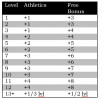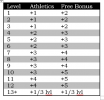Jamfke
Legendary Pubber
- Joined
- Dec 28, 2019
- Messages
- 1,011
- Reaction score
- 4,944
I'm working on a fantasy project that is essentially bare bare bones with a sandbox-ish style. I currently have the four basic classes you find in every other setting, but I'm wondering what everyone else's preference is when it comes to how many is enough, or too much, or just right for baby bear? If you do prefer more than 4 (C what I did there?), what are your faves? Let me know in the comments below.
Hey, I made a rhyme in that last line...
Did it again. Sorry. It's late and I'm old and...what did I come in here for?
Thanks!
Hey, I made a rhyme in that last line...
Did it again. Sorry. It's late and I'm old and...what did I come in here for?
Thanks!







